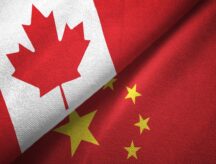Canada to recognize more vaccines, will soon require international students and workers to be fully vaccinated
Canada announced several new measures at the border that will begin to take effect at the end of the month.
Starting November 30, Canada will expand the list of COVID-19 vaccines that travellers can receive to be considered fully vaccinated, according to a government media release. Sinopharm, Sinovac, and COVAXIN will be added to the existing list of approved manufacturers like Pfizer, Moderna, Astra Zeneca, and Johnson and Johnson.
Get help with Canadian work permits
Then as of January 15, 2022, certain exempt travellers will only be allowed to enter the country if they are fully vaccinated with one of the approved vaccines. This list includes:
- family members of Canadians, permanent residents, and people registered under the Indian Act;
- international students age 18 and older;
- athletes;
- work permit holders, except for those working in agriculture and food processing; and
- essential service providers, such as truckers.
After the new measures come into effect, people who are unvaccinated or partially-vaccinated will only be allowed to travel to Canada if they meet an exemption. Some of the exempt groups include agricultural and food processing workers, marine crew members, people coming on compassionate grounds, new permanent residents, resettling refugees, and some children under age 18. These travellers, who are exempt from needing to be fully vaccinated, will still be subject to testing, quarantine, and other entry requirements. Those who are not vaccinated and do not fall under an exemption will be prohibited from entering Canada.
Also, as of November 30, fully vaccinated Canadian citizens and permanent residents will be able to return to the country without a COVID-19 test if their trip was for less than 72 hours. Canadian travellers who leave the country for more than three days will still be required to provide a negative PCR pre-arrival test upon their return.
Earlier this week, Prime Minister Justin Trudeau told U.S. lawmakers that Canada is planning a three-phased approach to removing the requirement for travellers to provide border officials with a PCR test, the Globe and Mail reports. The next phase is expected to affect U.S. travellers. After that, testing measures are expected to lift for travellers from the rest of the world.
The U.S. recently rolled back restrictions on Canadians crossing the land border for non-essential reasons. Fully vaccinated travellers were not required to submit a test when entering the U.S., but would have to provide one when crossing into Canada.
For many weeks, experts have been calling on the Canadian government to consider removing the costly COVID-19 PCR test requirement for fully vaccinated travellers on short cross-border trips. The main reason given is that these tests are expensive, typically between $150 and $300, and can be logistically difficult to perform if the length of stay is short. According to many people, such as those who have to travel frequently for business, this makes it very expensive to travel between the two countries.
The Canadian Chamber of Commerce issued a statement on November 17, calling on Canada to remove the pre-departure PCR test requirement for vaccinated travellers.
"Getting rid of unnecessary and outdated travel rules will help Canada's businesses get back to work – and compete," Perrin Beatty, president and CEO of the Chamber of Commerce, said in the release.
Discover if You’re Eligible for Canadian Immigration
© CIC News All Rights Reserved. Visit CanadaVisa.com to discover your Canadian immigration options.
- Do you need Canadian immigration assistance? Contact the Contact Cohen Immigration Law firm by completing our form
- Send us your feedback or your non-legal assistance questions by emailing us at media@canadavisa.com







